Does Spicy Food Cause Acne?
Published: 23 Mar 2025
Acne affects nearly 85% of people at some point in their lives, and diet is often blamed as a trigger. Spicy food, in particular, is said to cause breakouts, but is there any truth to this claim?
While no scientific evidence directly links spicy food to acne, it may still play a role in skin irritation and inflammation. Let’s explore how spicy meals might affect your skin and whether you need to cut them out.
1- How Spicy Food and Acne Are Linked
There are a lot of studies being conducted on diet and acne. Many people also relate acne to other foods, such as mangoes, bananas, almond milk, rice, eggs, dairy, junk food or even peanut butter.
Wondering if your favourite spicy meal could be making your skin worse? Let’s break it down.
1.1 Does Spicy Food Really Cause Acne? Here’s the Truth
Research shows no conclusive proof that spicy food directly leads to acne. However, while spices themselves may not be the culprit, certain effects of eating spicy food can contribute to acne flare-ups, especially for people with sensitive or acne-prone skin. (1)
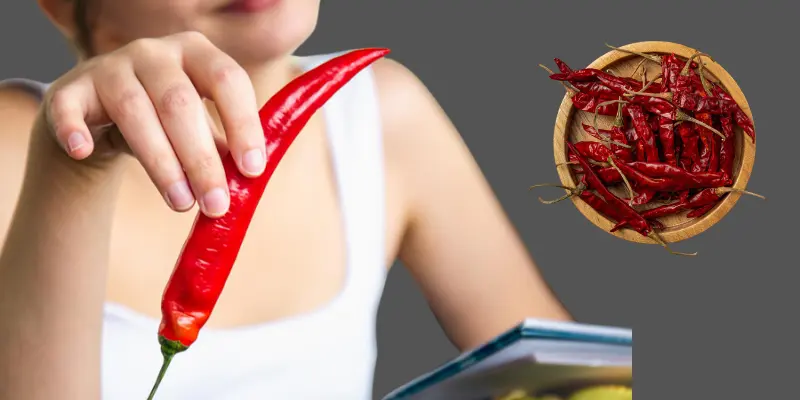
1.2 5 Ways Spicy Food Might Trigger Acne Flare-Ups
While spicy food doesn’t directly cause acne, it can contribute to breakouts in a few ways:
1.2.1. Increases Body Temperature → More Sweating → Clogged Pores
- Eating spicy foods raises body temperature, leading to more sweating.
- Excess sweat can mix with dirt and oil, clogging pores and leading to breakouts.
- People with oily skin may notice worsening acne after consuming spicy meals. (2)
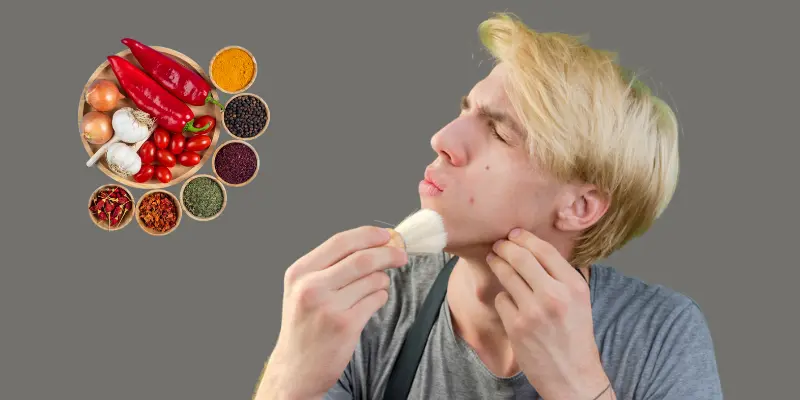
1.2.2. Triggers Inflammation → Can Make Existing Acne Worse
- Spicy foods contain capsaicin, which can cause skin inflammation in some people.
- This may lead to redness, irritation, and worsening of existing acne.
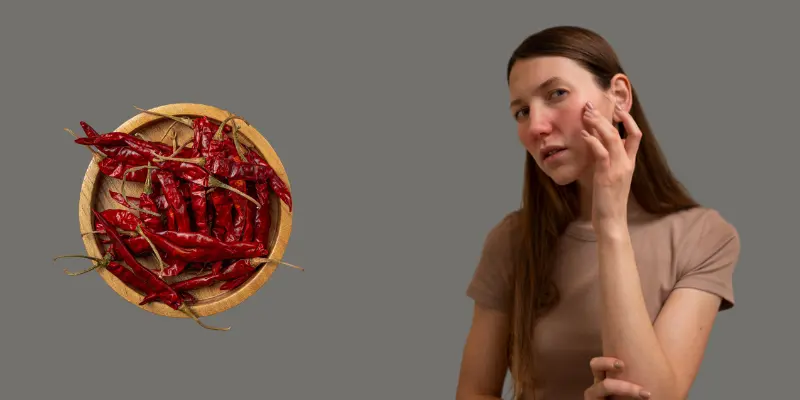
1.2.3. Common Spicy Food Ingredients May Irritate the Skin
- Ingredients like chilli, hot sauce, and peppers can irritate, especially in sensitive skin types.
- Some people may experience a mild allergic reaction, leading to redness and flare-ups.
1.2.4. Spicy Foods Are Often Paired with Greasy or Acidic Foods
- Many spicy meals include fried or oily ingredients (e.g., spicy fried chicken, greasy curries).
- Oily foods can increase sebum production, leading to more clogged pores.
- Acidic foods, like tomatoes and citrus in spicy dishes, may disrupt the skin’s pH balance, contributing to irritation.
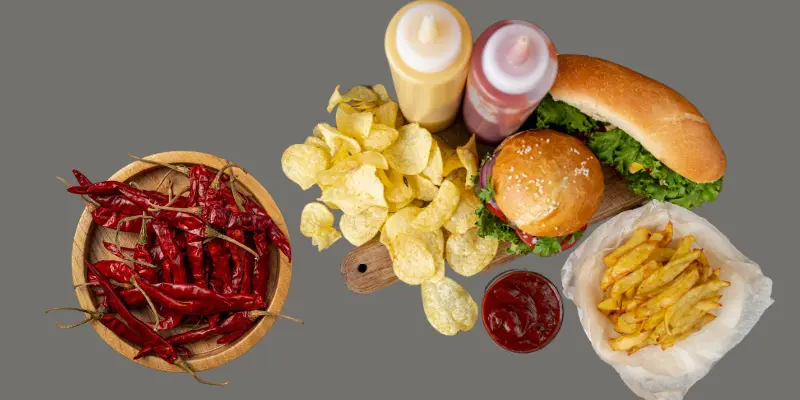
1.2.5. Digestive Issues → Potential Skin Reactions
- Spicy foods can cause digestive problems in some individuals, leading to gut inflammation.
- An unhealthy gut has been linked to skin issues, including acne, due to increased systemic inflammation
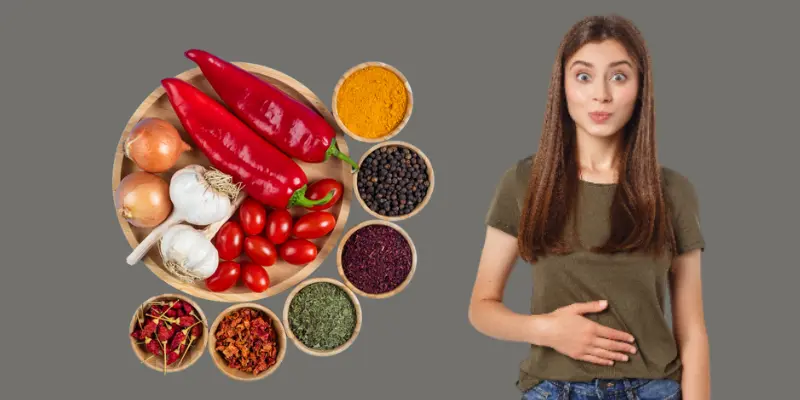
2- Other Dietary Factors That May Worsen Your Acne
While spicy food might play a role in acne flare-ups, other dietary factors can also contribute to breakouts.
Foods high in sugar, dairy, and unhealthy fats have been linked to increased oil production and inflammation, which may worsen acne.
Want to enjoy spicy food without hurting your skin? Here’s what I recommend…
| 3- Smart Ways to Eat Spicy Food Without Breaking Out |
|---|
Love spicy food but are worried about breakouts? You don’t have to give it up completely! Here are some simple tips to enjoy your favourite spicy meals while keeping your skin happy:
By making small adjustments, you can still enjoy the heat without stressing your skin! |
Still wondering if your favourite foods are messing with your skin? Dive deeper with our latest skin-friendly diet tips, your future clear skin will thank you!
4- Final Thoughts: Should You Avoid Spicy Food for Clearer Skin?
So guys, in this article, we’ve covered “Does Spicy Food Cause Acne?” in detail. While science doesn’t fully blame spicy food for acne, certain ingredients might not be doing your skin any favours.
My advice? Enjoy your favourite spicy meals but in moderation, pair them with healthy foods, drink plenty of water, and see what works best for your skin. Skin health is personal, and small tweaks in your routine can make a big difference.
Have any spicy food experiences to share? Drop them below. I’d love to hear.
Found this helpful? Share it with your friends
5- FAQs
No, there’s no scientific proof that spicy food directly causes acne. However, it can trigger factors like sweating, increased oil production, or inflammation that may worsen breakouts. If you notice a reaction, it’s best to observe how your skin responds to spicy meals.
Spicy food raises your body temperature, making you sweat more, which can clog pores and lead to breakouts. It can also trigger inflammation, worsening existing acne. Plus, spicy meals are often paired with oily or acidic foods, which may contribute to skin issues.
Not necessarily! Some spicy foods, like those with turmeric or ginger, have anti-inflammatory benefits. The key is moderation and avoiding spicy meals that are overly greasy, salty, or processed.
Chilli peppers, black pepper, and other hot spices can increase heat in the body and lead to flushing or irritation. Some people with sensitive skin may notice breakouts or redness after eating spicy foods. Pay attention to how your skin reacts to different spices.
Yes! Drinking water helps flush out toxins, keeps your skin hydrated, and reduces the chances of sweat clogging your pores. If you eat spicy food often, staying hydrated can help balance its effects on your skin.
If spicy food triggers your breakouts, reducing or eliminating it may help improve your skin. However, acne is caused by many factors, including hormones, genetics, and skincare habits. Instead of removing spicy food entirely, try cutting back and observing changes.
Pair spicy meals with skin-friendly foods like fresh vegetables, yogurt, or whole grains. These foods help balance inflammation and reduce the chance of irritation. Also, avoid excessive oil and dairy, as they may contribute to acne
Yes, spicy foods can temporarily increase blood flow, making your skin look flushed or red. This is more common in people with sensitive skin or conditions like rosacea. If redness lingers, try eating milder spices and see if it helps.
Surprisingly, yes! Some spicy ingredients, like turmeric and cayenne pepper, have anti-inflammatory and antioxidant properties. However, consuming too much spicy food can still irritate the skin, so balance is key.
Keep a food diary and track when you eat spicy meals and when breakouts occur. If you consistently notice flare-ups after eating spicy food, it might be a trigger for you. Try reducing your intake and see if your skin improves.
6- Sources
At MedicaWire, all medically sensitive content is reviewed by licensed healthcare professionals. Our team ensures that the information you read is accurate, up-to-date, and based on trusted medical sources.
Learn how we maintain high standards by reading our Editorial Policy.
📚 Sources
- National Library of Medicine (PubMed) – Salty and Spicy Food; Are They Involved in the Pathogenesis of Acne?
🔗 https://pubmed.ncbi.nlm.nih.gov - Marque Medical– 5 Foods That Cause Breakouts
- 🔗 https://marquemedical.com/5-foods-that-cause-breakouts/Nature – Systematic Review of the Epidemiology of Acne Vulgaris
- 🔗https://www.nature.com/articles/s41598-020-62715-3
ℹ️ Our Promise
MedicaWire follows strict sourcing guidelines and only references peer-reviewed studies, academic institutions, and reputable medical associations. We update content regularly to reflect new health information.

- Be Respectful
- Stay Relevant
- Stay Positive
- True Feedback
- Encourage Discussion
- Avoid Spamming
- No Fake News
- Don't Copy-Paste
- No Personal Attacks



- Be Respectful
- Stay Relevant
- Stay Positive
- True Feedback
- Encourage Discussion
- Avoid Spamming
- No Fake News
- Don't Copy-Paste
- No Personal Attacks




